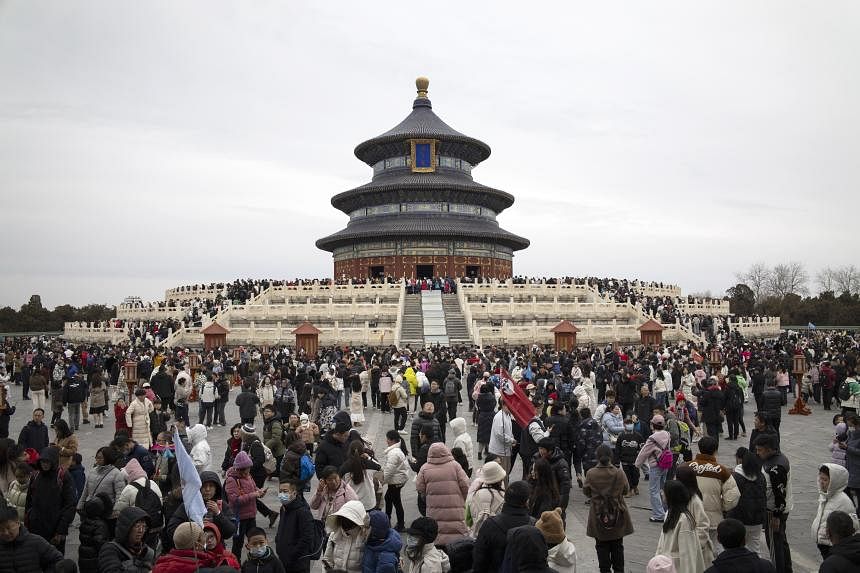BEIJING – Chinese citizens spent a record amount this Chinese New Year season on travelling and at the cinema, yet consumer confidence remains muted amid an uncertain economic outlook.
Analysts pointed to how per-person spending did not increase during the eight-day Spring Festival holiday from Feb 10 to 17 as a slump in property prices continues to make Chinese consumers more cautious.
Official data issued on Feb 18 showed that Chinese tourists made 474 million domestic trips during Chinese New Year – an increase of 19 per cent over the same period in 2019. Domestic tourism revenue hit 632.69 billion yuan (S$120 billion), a 7.7 per cent growth compared with 2019.
Many Chinese went to the cinema during the festive period, with box-office revenue hitting a record 8.02 billion yuan from 163 million tickets.
The nation’s box-office during the Chinese New Year (CNY) holiday was led by the chart-topping domestic comedy-drama Yolo, starring actress Jia Ling as a meek woman who improves herself through boxing and weight loss.

In second place was racing comedy Pegasus 2, followed by the animated Boonie Bears: Time Twist, featuring characters from the popular Chinese children’s TV show of the same name. Domestic comedy films accounted for more than 97 per cent of the total earnings.
Analysts note that this year’s holiday – dubbed the first “real” one since Covid-19 pandemic restrictions were lifted in late 2022 – was one day longer than the usual seven days, which contributed to the record spending.
Average spending is also lower this season, said Ms Imke Wouters, a partner at management consulting firm Oliver Wyman. She pointed to how the number of trips has increased by 19 per cent but total spending rose by only 8 per cent, compared with 2019 figures.
But consumer confidence has been on the mend over the past year, she said, citing the Golden Week eight-day break in October 2023, which surpassed 2019 levels in the number of travellers and spending.
She added: “I don’t think that the CNY spending is a step change, and cautious sentiments will continue unless there is a clearer outlook in the real estate and stock market that things will improve.”
Official data showed China’s new home prices in 70 cities fell for the sixth straight month in December 2023. Such falling values are significant in China, where real estate accounts for some two-thirds of household wealth.
Assistant Professor Lu Xi from the Lee Kuan Yew School of Public Policy, who researches the Chinese economy, said the overall consumption growth this holiday season reflected an increase in quantity rather than an improvement in willingness to spend.
He said the prolonged lockdowns had spurred people’s enthusiasm for returning home and travelling.
China’s yearly Chinese New Year travel rush is often described as the world’s largest annual human migration, as Chinese return to their home towns to hold reunion dinners and visit tourist places.
While China lifted Covid-19 restrictions in late 2022, worries about new waves of infections dampened travel sentiment during Chinese New Year in January 2023.
This year, videos on social media showed popular spots such as the Great Wall packed with visitors.
The general economic outlook remains mixed.
China hit its official gross domestic product target of 5.2 per cent in 2023, but this was among its slowest growth in more than two decades aside from the pandemic years. Income expectations have been hit by regulatory crackdowns in sectors such as education and technology.
Pre-pandemic consumption growth in the high single digits may no longer be sustainable, although steady recovery is expected for the rest of 2024.
Ms Christine Peng, head of Greater China consumer sector at UBS, said that during Chinese New Year, retail sales – which include restaurant spending – rose by 8.5 per cent compared with 2023, citing Ministry of Commerce data.
This translates to a 20 per cent growth since 2019, she said, meaning that consumption is still growing, albeit at a slower pace than before the pandemic.
The 8.5 per cent growth also beats December’s 7.4 per cent year-on-year figure, she noted. “Having said that, the CNY period tends to reflect better figures than usual months because of the increase in travelling and social activities.”
Improving consumer confidence will boil down to housing prices and expectations of future income, she said.
A more stable regulatory environment, particularly in the finance, education, Internet and healthcare sectors, could help higher income earners to be more optimistic about future pay.
The mass market consumer, whose income was affected during the pandemic, could benefit from government subsidies, Ms Peng said.
Another solution is to improve social welfare.
Prof Lu said that by providing more adequate guarantees in areas such as pensions, healthcare and education, the need for savings can be reduced, improving current consumption.
“The question is whether the current fiscal situation allows the government to do so,” he added.


